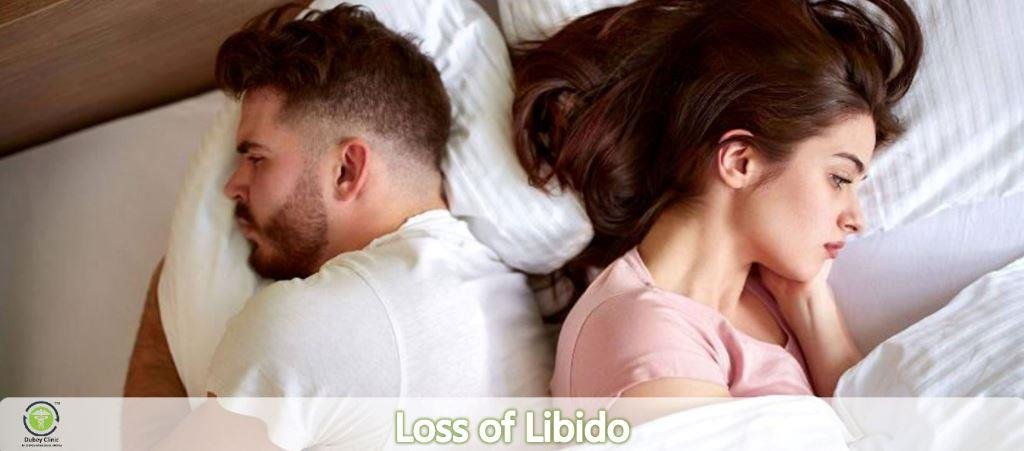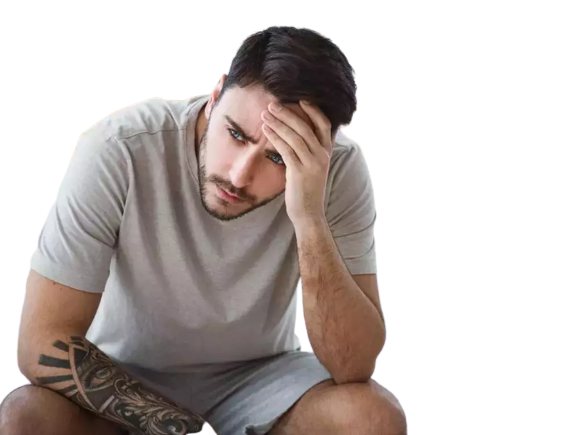
Looking for best Sexologist for Low Libido treatment…
Observation
Low libido, also called decreased sexual desire or low sexual desire, is a condition where a person has little or no interest or desire in sexual activity or intimacy. Generally, it is a common problem that can affect people of all genders and ages. Here, it is important to note that what is a "normal" libido varies from person to person, and low libido is only considered a problem if this low sexual desire is affecting or causing distress in a relationship or marital life.
World-renowned Ayurvedacharya Dr. Sunil Dubey, who is a top-rated sexologist in Patna, Bihar, has researched various sexual disorders in married and unmarried people. He treats a whole range of sexual problems with the help of modern and traditional medicine and provides personalized treatment. Based on his research and daily practice, he shares his experience on the problem of low libido. He says that low libido in men causes their erectile dysfunction, anorgasmia and ejaculation disorders such as impeded ejaculation.
Symptoms of decreased libido in men can be as follows-
-Lack of interest in any type of sexual activity, including masturbation.
-Decreased or no sexual fantasies or thoughts or excitement.
-Feeling depressed or anxious due to decreased sexual desire.
The problem of decreased libido in men is indeed a matter of concern as it affects the quality of life, self-esteem and personal outlook. The causes of decreased libido in a man can be varied and may be related to physical, psychological or a combination of both factors. Generally, some of the common causes include hormonal changes, stress, depression, relationship problems, physical health concerns and side effects of medications.
Symptoms
The primary symptom of low libido or loss of sexual desire in men is a persistent and recurrent loss of interest, desire and aspiration in sexual activity or thought. It can manifest in a person in many ways, such as-
Decreased or complete absence of desire for any sexual activity, including self-stimulation.
- Few or no sexual fantasies, thoughts, and excitement.
- Feelings of distress or anxiety about a low level of sexual interest.
- Reduced response to sexual cues or stimuli, which may be visual, physical or auditory.
- Disinterest in initiating sexual activity or avoiding situations that may lead to sexual activity.
Dr. Dubey says that out of these symptoms, the discomfort or anxiety caused by a loss of sexual interest is the main symptom of this sexual problem. We must know that low sexual desire is only considered a medical concern if it is causing personal or relationship problems. It is also important to remember that libido fluctuates naturally throughout a person's life due to various factors. Low sexual desire is considered a matter of concern only if this change is significantly different from your normal pattern and is causing discomfort to a person or his female partner.

Causes
World renowned Ayurvedacharya Dr. Sunil Dubey, who is the best Ayurvedic sexologist in Bihar, India, says that generally, loss of libido or reduced libido can arise from a number of factors, which can be classified into physical, psychological and lifestyle-related causes. It is often a complex problem that has multiple causes. Let's know these causes in detail.
Physical causes
Various factors such as hormonal changes, medical conditions, side effects of medications and other physical factors play a vital role in reducing libido in a person.
Hormonal changes: A decrease in testosterone levels, which naturally occurs with age, can be a major cause of a man's decreased libido. There are certain medical conditions that affect testosterone levels and increase other hormonal levels such as prolactin or cortisol.
Medical conditions: Chronic illnesses such as diabetes, heart disease, an underactive thyroid, cancer, and kidney or liver disease can affect a person's sexual desire. These medical conditions affect overall health and well-being.
Side-effects of medicines: Some medicines have side effects and cause a decrease in libido in a person. Antidepressants (especially SSRIs), blood pressure medications, hormonal birth control pills, and enlarged prostate medications have side effects on the body. These medicines react on the body and affect the person's libido.
Sexual Conditions: If a person struggles with his sexual life due to dyspareunia; then it can lower sexual desire.
Surgery or Injuries: Any surgery related to testicle or penile or genital tract can affect a person’s body image, sexual function, and desire for sexual activity.
Other physical factors: Certain physical conditions such as fatigue and lack of sleep, excessive or insufficient exercise, and excessive consumption of alcohol and drugs affect a person's libido.
Psychological causes
Psychological factors are related to the mental-health conditions of an individual where a person may experience a decrease in libido in their sexual life. There are some psychological conditions that are responsible for a decrease in libido, which are listed below.
Mental health problems: Depression, anxiety and stress are the major causes of decreased libido in a person. These conditions can lead to lack of energy, motivation and feelings of hopelessness, which can affect all aspects of life, even sexual relationships. On the one hand, poor body image and low self-esteem can also cause a decrease in sexual desire, while on the other hand, a person may struggle with his quality of life and social aspects.
Relationship problems: This is especially true for married people. Unresolved conflicts, a lack of emotional connection, or poor communication with a partner can seriously impact sexual intimacy and desire. Long-term relationships can sometimes develop feelings of lack of belonging or sexual attraction that need to be addressed to resolve it.
Past experiences and trauma: This is particularly true for any individual (male or female). A history of sexual trauma, misbehave, or other negative sexual experiences can have a lasting impact on a person's desire for sexual activity and intimacy.
Lifestyle factors
Generally, lifestyle always matters for overall health. While a balanced diet, good sleep, and an active lifestyle always help in living a healthy life, on the other hand, a bad lifestyle always creates problems in life.
Stress and anxiety: High levels of stress arising from work, financial or family responsibilities can lead to a state of persistent anxiety and exhaustion, which can reduce a person's sexual desire.
Lack of intimacy: Neglecting the relationship and not prioritizing emotional and physical intimacy can lead to a gradual decrease in the libido of both partners. This is also a reason for conflict in couples.

Types of Loss of Libido or Reduced Sexual Desire
Although "decreased libido" is a general term, it is useful to understand that it can be classified in a few different ways, which can help identify the underlying cause and provide appropriate treatment. As a person with reduced libido struggles with his erectile function, ejaculation disorder, and sexual satisfaction. In this condition, the type and onset of loss of libido in a person is helpful to get best treatment plan.
Hypoactive sexual desire disorder (HSDD)
It is a specific clinical diagnosis. HSDD is the persistent or recurrent decrease or absence of sexual fantasies and desire for sexual activity, which causes severe personal distress. It is a recognized sexual dysfunction and the most common type of sexual desire disorder (SDD). To be diagnosed with HSDD, the low libido must be causing the personal distress, not just a casual observation that your sexual desire has decreased.
Low libido is often classified by its underlying medical cause, as this is the most important factor in treatment. These categories are not mutually exclusive and multiple factors may be responsible for any particular individual.
Biological or physical loss of libido:
This type of reduced libido is caused by biological or medical problems. Some examples include:
•Hormonal imbalances (e.g., low testosterone levels in men, hormone fluctuations during menopause in women).
•Chronic illnesses (e.g., diabetes, heart disease, thyroid disorders).
•Side effects of medications (e.g., some antidepressants, blood pressure medications, hormonal contraceptives).
•Fatigue and persistent lack of sleep.
•Substance abuse (e.g., excessive alcohol or drug use).
•Surgery or Injuries in the genital area.
Psychological loss of libido:
This type of low libido in men is based on mental and emotional factors. Examples include:
•Mental health conditions such as depression, anxiety and stress.
•Poor body image or low self-esteem or low confidence level.
•History of sexual trauma or experience.
•Performance anxiety or fear of failure in sexual situations.
Relationship-based loss of libido:
This type of decreased sexual desire is related to problems within the romantic partnership. Examples include:
•Unresolved conflicts, poor communication, or lack of emotional connection with partner.
•Lack of intimacy or shared time with partner.
•Differences in sexual needs or preferences between partners.
•Lack of trust, infidelity and compulsive relationships.
Based on onset:
Sometimes, decreased libido is classified based on when it started:
•Primary decreased libido: The person has always had a low sexual desire in his life.
•Secondary decreased libido: The person had a normal sexual desire that later decreased.
Understanding these different classifications can help a person or his or her health care professional locate the source of the problem and create a targeted safe and effective treatment plan, which may include medical intervention, therapy, or lifestyle changes.


